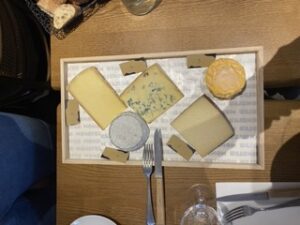
On Wednesday, May 25th, our class took a trip to a cheese tasting at Fromagerie Monbleu where we were introduced to a variety of cheeses made from goat, camel, and cow’s milk that were unique to France! As a cheese lover, I was excited to stray away from American cheese and try the real deal! To truly be able to savor the distinct flavors of French cheeses, we were first taught the difference between the terms “flavor” and “taste” which are oftentimes confused. Our guide asked us to close our eyes, hold our noses shut, and put out one hand where we would receive seeds to put in our mouths and blindly chew. By restricting these senses, the seeds tasted very bland with no notable flavor. To my surprise, as soon as our guide asked us to open our eyes and breathe through our noses, there was an explosion of flavor in my mouth! It was later revealed that we had been given coriander seeds, distinct for their aroma and citrus flavor. It was fascinating to experience the difference between blocking and allowing our senses to do their function.

The cheese tasting was a perfect continuity to the first article that our class has been discussing in Dr. Easterling’s global neuroscience perspectives course. The study examines the relationship between the macronutrient content of highly palatable foods (cheese) and the stress-relieving effects through the hypothalamic-pituitary-adrenal (HPA) axis response (Fourman et al., 2021). In conjunction with the author’s prior studies, the results indicated that palatable foods are able to reduce stress responses no matter their macronutrient content (sucrose or carbohydrate). Our in-class discussion of cheese and its stress-reducing abilities paired with the cheese tasting led to my search for more information about stress-induced comfort eating in college students.
The study that I found talked about stress levels in college students and how students who experienced higher levels of stress developed less healthy dietary behaviors (Choi, 2020). This is especially pertinent to me and my classmates as our stressors include adjusting to a new time zone, adjusting to a new city and rhythm of life, and taking eight credits in six weeks! The study and my experience walking around the city made me wonder about how the scenic routes to and from class, in addition to popular dine-in-only food options, combat our stress responses to the new and challenging environment of Paris. Perhaps the excitement, increased daily walking, and the fresh ingredients in our French cuisine will reduce our stress!
Choi J. (2020). Impact of Stress Levels on Eating Behaviors among College Students. Nutrients, 12(5), 1241. https://doi.org/10.3390/nu12051241
Fourman, S., Buesing, D., Girvin, S., Nashawi, H., & Ulrich-Lai, Y. M. (2021). Limited cheese intake reduces HPA axis and behavioral stress responses in male rats. Physiology & Behavior, 242, 113614. https://doi.org/10.1016/j.physbeh.2021.113614
